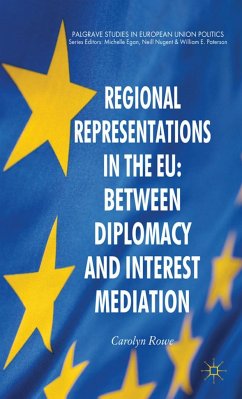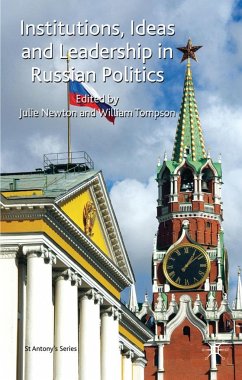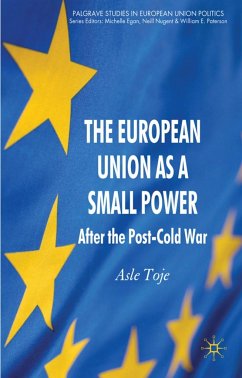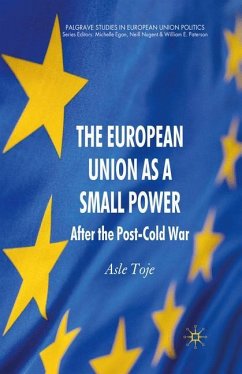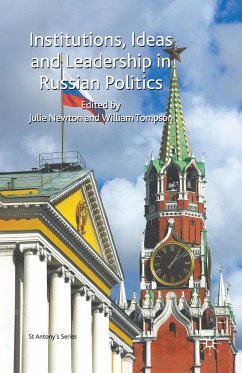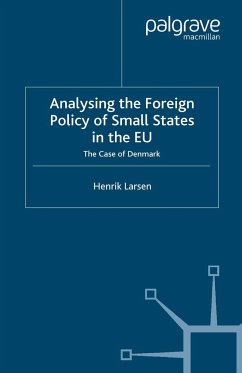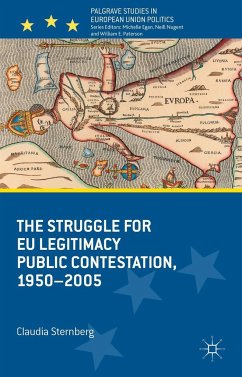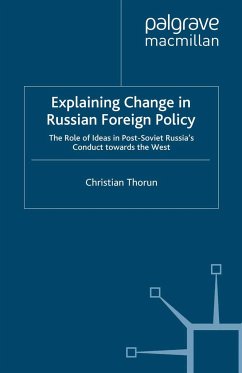
Versandkostenfrei!
Versandfertig in 6-10 Tagen

PAYBACK Punkte
19 °P sammeln!





"Small States and EU Governance" shows that the EU's rotating Council presidency and small states' capacity to make use of it have been underestimated. It examines the political objectives the presidency serves and presents a systematic and comparative assessment of its nature and influence in internal market and foreign policy issues.
SIMONE BUNSE is Assistant Professor at the INCAE Business School, Costa Rica. She holds a DPhil in Politics from the University of Oxford, UK and is a former visiting researcher at the Free University of Brussels. Her work focuses on institutions and leadership in the EU. She has published on the 2003 Greek Council Presidency and co-published with Paul Magnette and Kalypso NicolaIdis on Power Politics in the Convention in Leadership in the Big Bangs of European Integration.
Produktdetails
- St Antony's Series
- Verlag: Springer Palgrave Macmillan
- 2009 edition
- Seitenzahl: 290
- Erscheinungstermin: 26. März 2009
- Englisch
- Abmessung: 216mm x 137mm x 23mm
- Gewicht: 488g
- ISBN-13: 9780230537316
- ISBN-10: 0230537316
- Artikelnr.: 23816507
Herstellerkennzeichnung
Libri GmbH
Europaallee 1
36244 Bad Hersfeld
gpsr@libri.de
Listed as a CHOICE outstanding academic title.
'The Council of Ministers is the least known institution of the European Union among the public. Although it consists of the representatives of the governments of the Member States and thus by definition ought to be in close contact with the European citizens, the doings and makings of the Council fall in the shadow of the European Commission and the European Parliament. A gradual opening of the decision making process of the Council to the public has improved the situation to some extent. Dr Bunse has written an outstanding book on the proceedings of the Council. Her deep understanding of how the Presidency works, on what can be achieved in a short period of six months, on the
'The Council of Ministers is the least known institution of the European Union among the public. Although it consists of the representatives of the governments of the Member States and thus by definition ought to be in close contact with the European citizens, the doings and makings of the Council fall in the shadow of the European Commission and the European Parliament. A gradual opening of the decision making process of the Council to the public has improved the situation to some extent. Dr Bunse has written an outstanding book on the proceedings of the Council. Her deep understanding of how the Presidency works, on what can be achieved in a short period of six months, on the
Mehr anzeigen
premises of setting the agenda and translating it into concrete results, and on the interplay between the Council of Ministers, the European Commission and the European Parliament is a fascinating read and gives a rare insight for the reader. Thisbook is recommended to scholars, practitioners and anyone who has an active interest in the European integration process.'
- Jan Store, Permanent Representative of Finland to the European Union and Deputy Permanent Representative at the time of the first Finnish Presidency in 1999
'An excellent book on an important subject. Dr Bunse provides intellectual rigour and much scope for reflection on an institution whose role is frequently misunderstood by scholars and practitioners alike.In addressing the role of the rotating Presidency, and providing a useful critique of schemes to replace it with something more permanent, she provides food for thought for those involved in any future revision of the EU treaties. More broadly, in explaining the role of the Presidency in Institutionalist terms as an instance of intergovernmental entrepreneurship, she also challenges much of the extant literature which argues, or assumes, that it is supranationalism alone which renders integration effective.'
Anand Menon, Director of the European Research Institute and Professor of West European Politics, University of Birmingham, UK
- Jan Store, Permanent Representative of Finland to the European Union and Deputy Permanent Representative at the time of the first Finnish Presidency in 1999
'An excellent book on an important subject. Dr Bunse provides intellectual rigour and much scope for reflection on an institution whose role is frequently misunderstood by scholars and practitioners alike.In addressing the role of the rotating Presidency, and providing a useful critique of schemes to replace it with something more permanent, she provides food for thought for those involved in any future revision of the EU treaties. More broadly, in explaining the role of the Presidency in Institutionalist terms as an instance of intergovernmental entrepreneurship, she also challenges much of the extant literature which argues, or assumes, that it is supranationalism alone which renders integration effective.'
Anand Menon, Director of the European Research Institute and Professor of West European Politics, University of Birmingham, UK
Schließen
Für dieses Produkt wurde noch keine Bewertung abgegeben. Wir würden uns sehr freuen, wenn du die erste Bewertung schreibst!
Eine Bewertung schreiben
Eine Bewertung schreiben
Andere Kunden interessierten sich für




